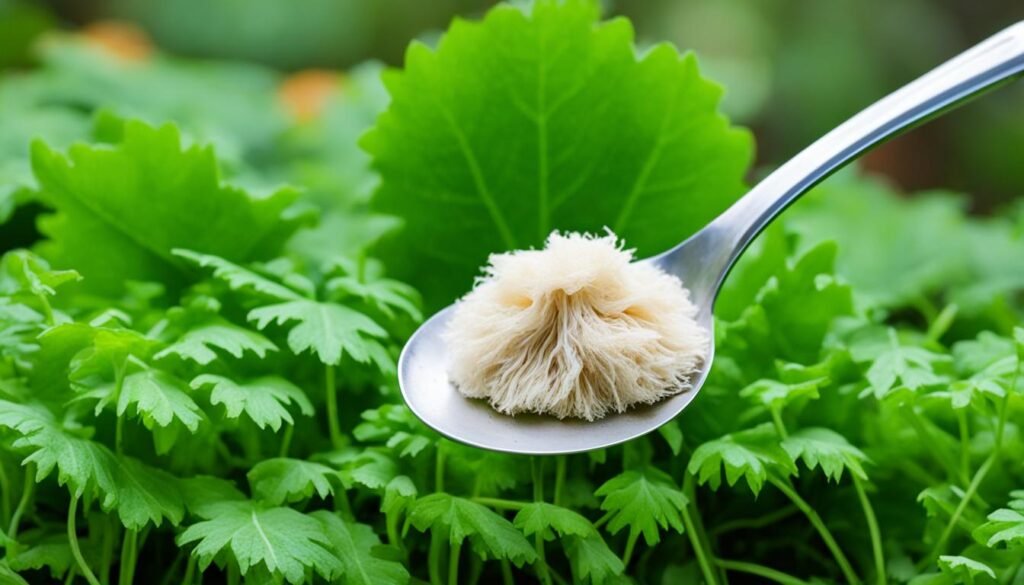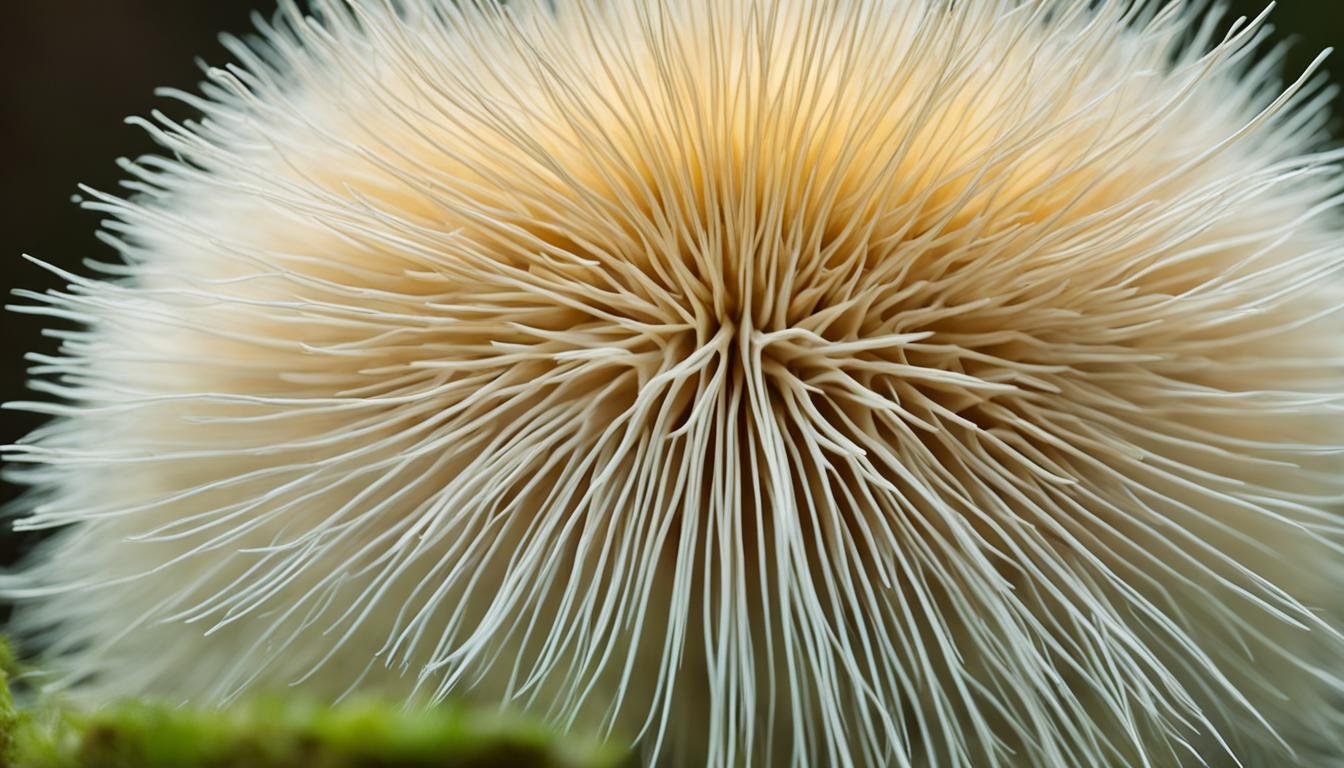Did you know that by eating cookies with Lion’s mane, Japanese women reduced depression and stress in just 4 weeks1? Lion’s mane, also known as Hericium erinaceus, isn’t just tasty. It has amazing benefits for your brain, heart, and gut.
This mushroom is a nutrition powerhouse. It’s loaded with important vitamins and minerals. These include thiamine, riboflavin, niacin, manganese, zinc, and potassium1. It’s been beloved in Asia for a long time for its great taste and health benefits1.
The Lion’s mane mushroom helps your brain work better and lowers feelings of depression and anxiety. It also protects your stomach from ulcers and helps nerves heal12.
Studies have found that Lion’s mane boosts a special protein called nerve growth factor (NGF). This may mean better brain health and thinking skills2. But, we need more human studies to know for sure about all its health claims.
Key Takeaways
- Japanese women consuming Lion’s mane reported reduced stress and depression after 4 weeks1.
- Lion’s mane mushrooms are rich in essential vitamins and minerals, supporting overall health1.
- This mushroom benefits brain health by promoting nerve growth factor (NGF) production2.
- Used extensively in Asian cultures for both culinary and medicinal purposes1.
- Numerous studies indicate potential relief from cognitive impairment, anxiety, and digestive issues12.
Introduction to Lion’s Mane Mushroom
The lion’s mane mushroom is a big, white, shaggy fungus that looks like a lion’s mane. Its scientific name is Hericium erinaceus. It’s famous for its benefits in cooking and health. People in China, India, Japan, and Korea have used it a lot3. This mushroom is full of vitamins and minerals, making it great for your diet.
Lion’s mane can make your meals better with its special taste, almost like seafood. You can eat it fresh, dry, or cooked4. It also has special compounds like polysaccharides and erinacines that are good for your health4. They might help as antioxidants and anti-inflammatories.
There have been some good signs in early studies, especially in animals and test tubes. But, we really need more solid human research. For example, it seems to speed up healing in rats and might help with Alzheimer’s, depression, and anxiety354.
Lion’s mane isn’t just good for eating; it could have real health perks. Still, we have to check more with human studies. This way, we can see if this cool mushroom can truly help us stay healthy and feel good.
Health Benefits of Lion’s Mane Mushroom
Lion’s mane mushroom is a type of medicinal mushroom from traditional Chinese medicine. It is known for various health perks6. This mushroom boosts brain health by growing new brain cells7. In a 2023 study with mice, lion’s mane was found to improve memory and grow new brain cells, suggesting potential health benefits6.
It also fights off memory problems often tied to Alzheimer’s. Studies show it can protect against memory loss caused by amyloid beta in mice6. A 2009 study hinted that older adults with mild memory issues got cognitive boosts from lion’s mane supplements6.
Lion’s mane might help with anxiety and depression because of its anti-inflammatory properties7. A review in 2021 found it to be effective against anxiety6. And, an 8-week supplement trial showed it could improve sleep and lower depression and anxiety in people8. It might also speed up nerve injury recovery7.
Eating lion’s mane may guard against ulcers by stopping the growth of H. pylori bacteria7. It can also lower heart disease risk by reducing blood triglyceride levels7. Lion’s mane seems to help manage diabetes by lowering blood sugar7. Plus, it has shown promise in fighting cancer by causing certain cancer cells to die7.
Lion’s mane is known for being a strong antioxidant and anti-inflammatory. It’s considered one of the top mushrooms for fighting cell damage and stress7. Yet, make sure to talk to your doctor before using lion’s mane for any long-term health issue. This is because there is still a need for more human studies6.
Lion’s Mane for Cognitive Support
Lion’s Mane Mushroom offers a fresh way to boost brain health naturally. It’s known for helping memory and focus. For those looking to enhance their mind naturally, it’s a promising choice.
Lion’s Mane for Memory Enhancement
Research found that lion’s mane can grow brain cells in the memory center. In tests, these special parts of lion’s mane helped memory directly9. When mice had lion’s mane, their memory did better9. And, it may help prevent memory problems like Alzheimer’s by boosting special brain proteins10. So, lion’s mane could be a key helper for older folks wanting to keep their memory sharp.
Lion’s Mane for Focus and Concentration
Lion’s mane is also great for boosting focus and concentration. It does this by helping special brain messages and growth. In mouse studies, lion’s mane increased these factors, helping them focus better11. It also encouraged more brain cell growth, which is crucial for clear thinking9. Many studies support these mind-boosting benefits910. While more testing is needed, lion’s mane shows real promise in keeping the mind sharp.
Role in Neurogenesis and Nerve Regeneration
Lion’s Mane Mushroom plays a big role in making new brain cells and regrowing nerves. Its special parts help grow brain cells. Also, they protect against diseases like Alzheimer’s.
Stimulating Brain Cell Growth
At The University of Queensland, experts found special parts in Lion’s Mane Mushroom. These parts help nerves grow and make memory better12. In tests, they saw a big difference in brain cell growth. The mushroom’s parts help cells connect, making the brain work better12. Other studies show mushroom parts like NDPIH and hericene A help brain cells grow. Cells grew twice as much when they had these parts13.
Protection Against Alzheimer’s Disease
Lion’s Mane Mushroom might guard against Alzheimer’s disease too. Mice that ate the mushroom or got hericene A had better memory and more brain help. This shows the mushroom can help memory12. Some mushroom parts like hericenones and erinacines make an important substance. This substance is needed by certain nerve cells. It helps keep the brain working14. In Korea, a test to see how well these parts work in Alzheimer’s patients is happening13.
In addition to the above, here’s a detailed table that outlines the key findings and effects of Lion’s Mane Mushroom:
| Study/Source | Key Finding | Effect/Outcome |
|---|---|---|
| University of Queensland Research12 | Discovery of new active compounds | Promoted nerve growth and enhanced memory |
| Pre-clinical Testing12 | Impact on brain cell growth | Increased size of growth cones, facilitating neuron connections |
| Neuron Study13 | Exposure to mushroom extracts | Neurons grew up to twice as long |
| Memory Enhancement in Mice12 | Dietary supplementation | Improved cognitive performance |
| NGF Synthesis14 | Stimulated by hericenones and erinacines | Crucial for maintaining basal forebrain cholinergic system |
Potential in Managing Mental Health
Lion’s Mane mushroom is a fascinating topic in scientific research. Its possible benefits for mental health have intrigued many experts.
Relieving Symptoms of Depression
Depression is a big concern worldwide and it’s getting worse. By 2030, depression’s impact on health is expected to be even greater15. Lion’s Mane stands out for its ability to protect our nerve cells and fight inflammation, key factors in mental health and depression15. It contains Ergothioneine, a compound with strong antioxidant powers. This can help the brain deal with stress, showing Lion’s Mane might be a good help for depression15. Studies also show Hericium erinaceus mycelium, rich in erinacine A, acts like an antidepressant by influencing key brain chemicals linked to depression and mental health15. These results propose that Lion’s Mane could be a natural way to support your mental well-being.
Reducing Anxiety Levels
Lion’s Mane could be just as helpful for anxiety. Research points to its ability to lessen both anxious and depressive behaviors in animals by boosting the growth of new nerve cells in the brain15. The compound amycenone in Lion’s Mane seems to lower levels of inflammation in the blood, which might help control anxiety15. A study by Nagano and colleagues found that taking Hericium erinaceus for four weeks reduced anxiety and depression in participants16. This research highlights Lion’s Mane as a possible natural solution for anxiety, for those wanting to support their mental health with what they eat.
More studies and clinical trials are needed. They will help us better understand how effective Lion’s Mane is for treating depression and anxiety. This work is important for those looking for holistic approaches to mental health.
Culinary Uses of Lion’s Mane Mushroom
Lion’s Mane mushrooms are known for their special taste and how flexible they are in the kitchen. They can be cooked, dried, or you can eat them as they are. This makes them a fun addition to many meals. You can find them in the North of the United States and Canada17.
There are many ways to cook with Lion’s Mane. They have a texture that is almost like meat, which is great for vegetarian and vegan meals. They add a unique taste that’s often compared to seafood but they come from land, not water. So, you can use them in all sorts of dishes. From frying or grilling them, to including them in broths and powders for drinks, the options are wide17.

Lion’s Mane mushrooms are not just tasty, they are good for you too. They have important amino acids, potassium, and fiber. This makes them a valuable part of a healthy diet17. Also, they are thought to help your nerves heal and fight off harmful germs. So, adding them to your meals is like a little health boost18.
Storing them is easy. Keep fresh ones in the fridge for up to a week. Dried ones last forever if you store them right17. By sautéing or freezing them, you can keep the flavor for a long time without any loss17.
Sizzling Lion’s Mane mushrooms in a pan is a popular way to cook them. For this, you might use ghee or butter, tamari or coconut aminos, garlic, salt, and parsley. It’s simple and delicious19. You can find these mushrooms more and more in farmers’ markets and specialty shops. People are really starting to enjoy them both for their flavor and potential health gains1819. Adding them to your meals is a way to explore new tastes and healthy options.
How to Incorporate into Your Diet
Lion’s mane mushroom has many health benefits. It adds nutrition and delicious flavor to your meals. This ingredient can boost the taste of various dishes or act as a powerful supplement.
Recipes and Cooking Tips
If you enjoy trying new recipes, lion’s mane is perfect. It tastes like seafood, especially lobster or crab. It makes food more exciting20. Cooking methods like sautéing, roasting, or grilling enhance its meaty and buttery taste. Eating just two medium-sized mushrooms a day can lower cancer risk by 45%21. To make them even tastier, cook with olive oil and herbs.
Lion’s Mane Mushroom in Supplements
For an easy option, try lion’s mane supplements. They are available in capsules, powders, and tinctures22. Taking them regularly is key for their brain and immune system benefits22. Aim for a daily dose of 500 mg to 1,000 mg, which gives you important B vitamins and potassium21. Keep dried mushrooms in an airtight container in a cool, dark spot to preserve their quality for months22.
- Blend lion’s mane powder into smoothies for extra nutrition suitable for many diets22.
- Capsules are a simple way to ensure you get your nutrients every day22.
- Try tinctures by putting some drops into drinks or meals.
Studies suggest lion’s mane helps protect your brain and helps nerve growth21. By eating them or taking supplements, you can enjoy their taste and get their health advantages. Let’s make the most of what lion’s mane offers!
Review of Available Supplements
There are many lion’s mane mushroom supplements to choose from. They come in different forms for ease and preference. But, their quality and strength can differ a lot. Unlike pharmaceuticals, they’re not as strictly regulated by the FDA. Many users see only small improvements when they take these supplements23.
Yet, lion’s mane is known to cause few problems. Only a few people – less than 10% – might feel a bit of stomach upset or nausea24.
It’s important to look at reviews and studies to know if lion’s mane is truly effective and safe. Websites like ConsumerLab provide helpful reviews, with over 1,400 comments on lion’s mane alone23. They also check products for harmful substances like lead and mercury to make sure they’re safe23.
Lion’s mane has been found to fight cancer, kill germs, and act as an antioxidant10. Still, some companies have been told off by the FDA for quality issues. This means finding supplements with clear ingredient and production info is important23.
Despite these issues, lion’s mane mushrooms are mostly very safe to use. They don’t usually harm the liver or raise enzyme levels in the blood while taking them24.
Being careful is key, especially if you take other medicines23. People have used lion’s mane for healing since ancient times. Hippocrates, a famous Greek doctor, noticed its power to reduce swelling10.
It’s wise to carefully look over different supplements before choosing. This ensures you make the best and safest choice for your health10.
Recommended Dosage and Safety
It’s key to know the right lion’s mane mushroom dose for the best health results and safety. Studies show a daily dose between 500mg to 3000mg works well for most, tailor it to your needs25. For boosting your immune system and brain power, around 1000mg daily is a good target26. Different forms like capsules, powders, and gummies have their own dosages. For example, taking two 500mg capsules each day is a common recommendation27.

Always start with low doses and work your way up slowly. Taking up to three doses daily is okay, but you should not take more26. Lion’s mane can fit into your day easily, whether you add it to your tea, take it in capsules, or eat gummies. It’s worth noting that, if used correctly, lion’s mane doesn’t have many side effects and there have been no cases of overdose27.
Guidelines from Research Studies
Experts recommend starting with 1-3 grams of lion’s mane powder a day, then you can adjust this based on your health goals25. For extracts, between 250mg to 1000mg has shown to be effective27. It’s found that taking lion’s mane in the morning or early afternoon can give your brain a good boost26. Another method is using tinctures, which can be taken by putting two drops under your tongue27. Kids and older adults should take less because their bodies process things differently25.
Possible Side Effects and Precautions
Lion’s mane is usually safe, but it’s smart to know about any possible side effects and things to be careful of. Some people might feel a bit of stomach upset or have an allergic reaction. Pregnant people should avoid it until we know more about its safety when expecting26. If you have asthma, allergies, or are going to have surgery, you should talk to your doctor first26.
Considering all the ways lion’s mane can boost your health, from brain power to stress relief and immune support27, it’s crucial to use it the right way. By sticking to the recommended doses, you can get all the good effects without the bad ones.
Lion’s Mane Mushroom in Traditional Medicine
The lion’s mane mushroom has been a key part of traditional medicine for many years. It’s especially important in Asia, in countries like China, Japan, and Korea28. People used it historically to boost brain health, help stomach issues, and increase energy28.
Usage in Asian Countries
In Asia, lion’s mane has a strong tradition. In China, it’s a known remedy for stress, anxiety, and depression2428. Japan and Korea use it to sharpen the mind and support good stomach health28. Its special compounds, like hericenones and polysaccharides, play a big role in these uses2928.
Historical Medicinal Applications
Lion’s mane has a rich history in treating brain and stomach health in traditional ways28. Recent studies show it boosts a key factor for brain health called nerve growth factor (NGF)28. Its components, hericenones and erinacines, protect the brain and lower stroke risks2928.
Today, lion’s mane is still explored for its health benefits. It’s praised in both ancient and current medical practices. This shows its lasting value in health and wellness.
Research and Future Potential
Today, lion’s mane research is showing big promise. It looks into health and wellness. Recently, NUTRAN’s team at Northumbria University, UK, ran a study. They were looking at Lion’s Mane’s impact on how we think, handle stress, and our mood30. After 28 days, those taking Lion’s Mane felt much less stressed than those who didn’t30. Plus, studies back up the idea that Lion’s Mane is good for the brain. It seems to help our thinking, make us happier, and protect our brain cells31. This tells us that lion’s mane could become a key player in making our brains work better and feeling mentally well.
Current Studies and Findings
Ongoing research is also checking if Lion’s Mane could fight cancer. It has special compounds like polysaccharides that seem to help. They might help make nerve growth factor and boost our immune systems32. In Traditional Chinese Medicine, Lion’s Mane was used for better digestion and to support the immune system. So, it comes with a long history of health uses32.
Future Directions in Research
Natural and alternative remedies are getting more attention. This means the promise of Lion’s Mane is pretty big. The goal of the upcoming research is to really understand what good it can do and how we could use it in medicine32. Some studies are looking at young women to see if Lion’s Mane can make them feel less stressed and in a better mood30. Also, putting Lion’s Mane powder in foods, like pasta, could be a smart move. It might help these special compounds work even better for our health31. But, we have to be careful. There are some mixed results from studies about what Lion’s Mane can actually do31. It’s important for future work to look at all sides and make sure we understand clearly.
| Aspect | Current Findings | Future Research |
|---|---|---|
| Cognitive Function | Improved performance, reduced stress30 | Confirming acute and long-term benefits30 |
| Anti-Cancer Properties | Inhibits growth, stimulates immune response32 | Enhancing conventional treatments’ efficacy32 |
| Mood Improvement | Reduced stress levels in participants30 | Focus on Gen Z health improvements30 |
| Supplementation | Minimal differences in young adults31 | Understanding bioavailability and acute benefits30 |
Conclusion
Lion’s mane mushroom extract shows a lot of promise for health benefits. It especially helps with cognitive support and managing mental health. This unique fungi can increase nerve growth factor (NGF) and boost the immune system3334. It also acts as an antioxidant.
Not just that, it has been shown to sharpen cognitive functions, ease anxiety and depression, and aid in recovering from neurological conditions3335. But, it’s important to note we need more studies with humans to fully confirm these findings. While it has done well in animal studies and early human tests, larger human trials are needed for a complete picture.
Lion’s mane is making waves both in cooking and as a health supplement. Its uses expand beyond just meals to included supplements in modern wellness. So, both the culinary and medicinal world find lion’s mane very interesting. This mushroom extract deserves a closer look, attracting health fans and researchers.
FAQ
What are the primary health benefits of Lion’s Mane Mushroom?
Lion’s Mane Mushroom is known for keeping the brain sharp. It may help grow new brain cells and lower Alzheimer’s symptoms. It can also ease mild depression and anxiety. Additionally, it aids in nerve repair and guards against digestive ulcers.
It may lower heart disease and diabetes risks. There’s also a chance it fights cancer.
How does Lion’s Mane Mushroom support cognitive function?
Lion’s Mane helps the brain by boosting memory and focus. Special compounds in the mushroom, like hericenones, promote the growth of brain cells. They might even prevent brain diseases.
Can Lion’s Mane Mushroom help with mental health issues such as depression and anxiety?
Yes, Lion’s Mane Mushroom might help calm depression and anxiety. It fights inflammation in the brain. This makes the part of the brain linked to mood and memory work better.
What are some culinary uses for Lion’s Mane Mushroom?
It mimics a seafood flavor and works well in many dishes. You can eat it cooked, dried, or fresh. It’s great in vegetarian meals, like sautés, roasts, and soups.
Are there any potential side effects or precautions when using Lion’s Mane Mushroom?
Lion’s Mane is mostly safe, but some people could be allergic. Others might feel a bit sick after eating it. Always check with a doctor before trying lion’s mane, especially if on medication.
What forms of Lion’s Mane Mushroom supplements are available?
You can find Lion’s Mane in powders, liquids, and pills. Pick wisely based on quality and how clear the company is about what’s in their product.
How has Lion’s Mane Mushroom been used in traditional medicine?
In the past, Asia used it for gut health, brain strength, and general health. Today, scientists are digging into these old uses. They hope to find real health benefits.
What is the recommended dosage for Lion’s Mane Mushroom supplements?
No one size fits all for how much you should take. Studies have used different amounts. It is key to ask your doctor for advice on how much to take.
What current research exists on Lion’s Mane Mushroom?
There’s lots of animal and lab studies on Lion’s Mane. They suggest it’s good for the brain, mental health, and more. But, we need to see how it works in people to be sure.
How can Lion’s Mane Mushroom be incorporated into one’s diet?
Add it to meals by sautéing, roasting, or putting into soups. Or, go for easy-to-take supplements in various forms if cooking isn’t your thing.
Source Links
- https://www.webmd.com/diet/what-are-the-health-benefits-of-lions-mane-mushrooms – What Are the Health Benefits of Lion’s Mane Mushrooms?
- https://health.clevelandclinic.org/lions-mane-mushrooms-benefits – 5 Lion’s Mane Mushroom Benefits
- https://www.healthline.com/nutrition/lions-mane-mushroom – 9 Health Benefits of Lion’s Mane Mushroom (Plus Side Effects)
- https://www.everydayhealth.com/wellness/lions-mane/guide/ – Lion’s Mane Mushroom Guide: Nutrition, Benefits, Side Effects, More
- https://www.webmd.com/vitamins/ai/ingredientmono-1536/lions-mane-mushroom – LION’S MANE MUSHROOM: Overview, Uses, Side Effects, Precautions, Interactions, Dosing and Reviews
- https://www.verywellmind.com/the-benefits-of-lions-mane-89474 – Lion’s Mane Mushroom: Pros and Cons
- https://www.medicinenet.com/lions_mane_10_health_benefits_and_side_effects/article.htm – Lion’s Mane Mushrooms: 10 Health Benefits and Side Effects
- https://www.health.com/lions-mane-mushroom-benefits-7555400 – Health Benefits of Lion’s Mane Mushroom
- https://www.healthline.com/health-news/latest-study-suggests-lions-mane-mushrooms-may-boost-brain-heath – Latest Study Suggests Lion’s Mane Mushrooms May Boost Brain Health
- https://www.forbes.com/health/supplements/health-benefits-of-lions-mane/ – Health Benefits Of Lion’s Mane
- https://www.nutraingredients-usa.com/Article/2023/02/17/Lion-s-Mane-and-the-brain-Study-identifies-new-compounds-in-smart-mushroom – Lion’s Mane and the brain: Study identifies new compounds in ‘smart mushroom’
- https://neurosciencenews.com/mushroom-memory-neurogenesis-22476/ – Mushrooms Magnify Memory by Boosting Nerve Growth – Neuroscience News
- https://www.medicalnewstoday.com/articles/improving-memory-lions-mane-mushrooms-may-double-neuron-growth – Lion’s mane mushrooms may help improve memory, boost brain cell growth
- https://pubmed.ncbi.nlm.nih.gov/24266378/ – Neurotrophic properties of the Lion’s mane medicinal mushroom, Hericium erinaceus (Higher Basidiomycetes) from Malaysia – PubMed
- https://www.ncbi.nlm.nih.gov/pmc/articles/PMC6982118/ – Therapeutic Potential of Hericium erinaceus for Depressive Disorder
- https://www.ncbi.nlm.nih.gov/pmc/articles/PMC10675414/ – The Acute and Chronic Effects of Lion’s Mane Mushroom Supplementation on Cognitive Function, Stress and Mood in Young Adults: A Double-Blind, Parallel Groups, Pilot Study
- https://www.realmushrooms.com/cooking-lions-mane-mushroom/ – Cooking Lion’s Mane Mushroom: Tips, Techniques & Recipes
- https://www.marthastewart.com/8218903/lions-mane-mushroom-explained – Lion’s Mane Mushrooms Are a Great Substitute for Shellfish, but That’s Not the Only Reason to Love Them
- https://www.runningtothekitchen.com/how-to-cook-lions-mane-mushrooms/ – How To Cook Lion’s Mane Mushrooms
- https://www.wildfoods.co/blogs/content/how-to-eat-lions-mane-mushroom – How to Eat Lion’s Mane Mushrooms (Simple Preparation & Recipes)
- https://www.mayoclinichealthsystem.org/hometown-health/speaking-of-health/mushrooms-make-healthy-meal-magic – Mushrooms make healthy meal magic
- https://xoticmushrooms.com.au/blogs/tips/the-ultimate-guide-to-integrating-lion-s-mane-into-your-daily-diet – The Ultimate Guide to Integrating Lion’s Mane into Your Daily Diet
- https://www.consumerlab.com/reviews/lions-mane-and-chaga/lions-mane-chaga/ – Lion’s Mane and Chaga Supplements Review & Top Picks – ConsumerLab.com
- https://www.ncbi.nlm.nih.gov/books/NBK599740/ – Lion’s Mane – LiverTox – NCBI Bookshelf
- https://uk.naturecan.com/a/blog/cbd/lions-mane-dosage/ – Lion’s Mane Dosage | Best Way To Take | Naturecan UK
- https://rritual.com/blogs/usage/how-much-lions-mane-should-i-take – How Much Lion’s Mane Should I Take?
- https://www.mushroomrevival.com/blogs/blog/lions-mane-dosing-optimization – Lion’s Mane Dosage: How Much Should You Take?
- https://www.drinkteaa.com/blogs/mushroom-guide/hericium-erinaceus – What is Lion’s Mane?
- https://restorativemedicine.org/journal/neurological-activity-lions-mane-hericium-erinaceus/ – Herbal Medicine for Alzheimer’s Disease: Lion’s Mane (Hericium erinaceus)
- https://www.nutritioninsight.com/news/mental-health-mushrooms-spotlight-on-lions-mane-research-and-knowledge-gaps.html – Mental health mushrooms: Spotlight on Lion’s Mane research and knowledge gaps
- https://mdpiblog.wordpress.sciforum.net/2024/05/01/lions-mane-mushroom/ – Exploring the Science Behind Lion’s Mane Mushroom
- https://meltingforest.com/blogs/news/exploring-the-potential-of-lion-s-mane-in-cancer-treatment – Exploring the Potential of Lion’s Mane in Cancer Treatment
- https://www.medicalnewstoday.com/articles/323400 – Lion’s mane mushrooms: Benefits and side effects
- https://www.mindlabpro.com/blogs/nootropics/lions-mane-mushroom – Lion’s Mane Mushroom
- https://www.verywellhealth.com/lions-mane-benefits-and-nutrition-profile-7498004 – Lion’s Mane: Benefits and Nutrition Profile




